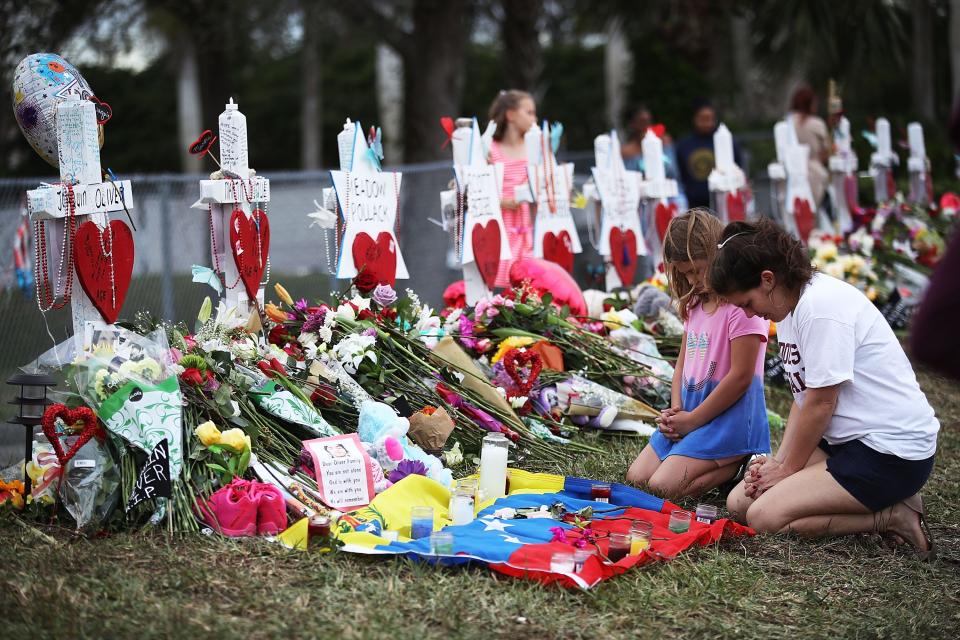Parkland resource officer Scot Peterson stayed outside as bullets flew. Is he negligent or a scapegoat?
Brian Claypool, a lawyer and mass shooting survivor who lobbies for stricter gun laws, says he is sensitive to the mental health issues associated with such attacks.
But Claypool rejects claims that Florida school resource officer Scot Peterson was made a scapegoat this week when he was criminally charged with child neglect and culpable negligence, accused of inaction during critical minutes while a gunman was killing 17 students and teachers at a Parkland school last year.
“I 100% applaud the arrest,” Claypool told USA TODAY. “It goes way above Peterson, it will send shock waves across the country. It is sending a message that schools must provide security for their kids.”
Peterson, 56, faces seven counts of neglect of a child, three counts of culpable negligence and one count of perjury. He was working on the campus of Marjory Stoneman Douglas High on Valentine’s Day last year when the shooting started, and when he arrived at the freshman building the carnage had not yet ended.
The arrest warrant claims Peterson stayed outside, moving several feet to a position of “increased personal safety” before six of the victims were fatally shot. It accuses him of “failing, declining or refusing” to confront the shooter.
A judge on Wednesday set bail at $102,000, and defense attorney Joseph DiRuzzo III said he expected his client to be released soon.
Claypool said gun restrictions and stronger mental health programs are crucial in the effort to halt the phenomenon of mass shootings across the nation. But he also said school officials must be held responsible for ensuring student safety.

Claypool said he would support charges against school administrators for providing security officers that allowed a dangerous former student access to the school – “they failed, too.”
“This is one of the components,” Claypool said. “But Peterson isn’t a scapegoat, he should be a starting point.”
More: 'I'm sick to my stomach': 17 dead in Florida high school shooting; former student in custody
Peterson has said he believed the shooting was taking place outside and followed protocol. DiRuzzo said Tuesday that his client is being made a scapegoat, calling the charges “nothing more than a thinly veiled attempt at politically motivated retribution.”
Jonathan Metzl, a professor of sociology and medicine, health and society at Vanderbilt University, says he is in no position to judge whether Peterson’s behavior was criminal. But he says focusing on the actions of one person raises the risk of “overlooking much bigger, systemic issues” that impact mass shootings
“There is evidence that they happen less frequently in states with strong gun laws and surrounded by strong gun-law states,” he said. “Potential red flags such as someone’s personal history are obviously important. We should be careful before we lay the blame at the feet of someone who did not rush in.”
Claypool was at an outdoor country music festival on the Las Vegas strip in October 2017 when a gunman opened fire on the crowd, killing 58 people. Claypool vividly remembers stepping over bodies and dodging bullets as they ricocheted around him. The trial lawyer represents more than 100 fellow survivors in litigation related to the shooting.
Claypool acknowledges that convictions might be difficult on some of the charges. He said showing gross recklessness and gross disregard would be difficult to prove beyond a reasonable doubt. Still, he applauds the prosecutors.
More: Parkland school shooting panel backs arming teachers, rips responding deputies
“I lived through a mass shooting, and I will tell you that any step in the right direction is monumental,” he said.
Florida lawyer Mark O’Mara agrees that convictions could be difficult to obtain. O’Mara, who successfully defended George Zimmerman after he fatally shot Trayvon Martin in 2013, says radio transmissions between Peterson and other officers could help determine the officer’s fate. Some of that was included in the arrest warrant.
“If they said breach the door and he didn’t, then he deserves a bunch of charges,” O’Mara said. “But it’s very unusual for a cop to be held responsible for not doing something in the face of insurmountable force.”
More: These dogs helped Parkland students cope with tragedy. They got their own yearbook page
If he were representing Peterson, O'Mara said he would explain to a jury that Peterson was in a “war zone” and provide an expert to testify how people react in times of stress.
“Even cops who are trained, the training isn’t always particularly effective,” O'Mara said.
Some of the Parkland survivors have expressed strong support for the arrest. Student Cameron Kasky tweeted that he was “thrilled” with the charges, saying it’s nice to know “some evil people get the punishment they deserve.”
Fred Guttenberg, whose daughter, Jaime, was among those who died, expressed similar thoughts.
“I have no comment except to say rot in hell Scott Petersen,” Guttenberg tweeted. “You could have saved some of the 17. You could have saved my daughter. You did not and then you lied about it and you deserve the misery coming your way.”
This article originally appeared on USA TODAY: Parkland resource officer Scot Peterson stayed outside as bullets flew. Is he negligent or a scapegoat?

